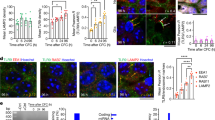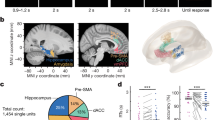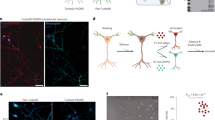Abstract
Millions of people regularly obtain insufficient sleep1. Given the effect of sleep deprivation on our lives, understanding the cellular and molecular pathways affected by sleep deprivation is clearly of social and clinical importance. One of the major effects of sleep deprivation on the brain is to produce memory deficits in learning models that are dependent on the hippocampus2,3,4,5. Here we have identified a molecular mechanism by which brief sleep deprivation alters hippocampal function. Sleep deprivation selectively impaired 3′, 5′-cyclic AMP (cAMP)- and protein kinase A (PKA)-dependent forms of synaptic plasticity6 in the mouse hippocampus, reduced cAMP signalling, and increased activity and protein levels of phosphodiesterase 4 (PDE4), an enzyme that degrades cAMP. Treatment of mice with phosphodiesterase inhibitors rescued the sleep-deprivation-induced deficits in cAMP signalling, synaptic plasticity and hippocampus-dependent memory. These findings demonstrate that brief sleep deprivation disrupts hippocampal function by interfering with cAMP signalling through increased PDE4 activity. Thus, drugs that enhance cAMP signalling may provide a new therapeutic approach to counteract the cognitive effects of sleep deprivation.
This is a preview of subscription content, access via your institution
Access options
Subscribe to this journal
Receive 51 print issues and online access
$199.00 per year
only $3.90 per issue
Buy this article
- Purchase on Springer Link
- Instant access to full article PDF
Prices may be subject to local taxes which are calculated during checkout




Similar content being viewed by others
References
Hublin, C., Kaprio, J., Partinen, M. & Koskenvuo, M. Insufficient sleep—a population-based study in adults. Sleep 24, 392–400 (2001)
Graves, L. A., Heller, E. A., Pack, A. I. & Abel, T. Sleep deprivation selectively impairs memory consolidation for contextual fear conditioning. Learn. Mem. 10, 168–176 (2003)
Guan, Z., Peng, X. & Fang, J. Sleep deprivation impairs spatial memory and decreases extracellular signal-regulated kinase phosphorylation in the hippocampus. Brain Res. 1018, 38–47 (2004)
McDermott, C. M. et al. Sleep deprivation causes behavioral, synaptic, and membrane excitability alterations in hippocampal neurons. J. Neurosci. 23, 9687–9695 (2003)
Smith, C. & Rose, G. M. Evidence for a paradoxical sleep window for place learning in the Morris water maze. Physiol. Behav. 59, 93–97 (1996)
Nguyen, P. V. & Woo, N. H. Regulation of hippocampal synaptic plasticity by cyclic AMP-dependent protein kinases. Prog. Neurobiol. 71, 401–437 (2003)
Martin, S. J., Grimwood, P. D. & Morris, R. G. Synaptic plasticity and memory: an evaluation of the hypothesis. Annu. Rev. Neurosci. 23, 649–711 (2000)
Huang, Y. Y. & Kandel, E. R. Recruitment of long-lasting and protein kinase A-dependent long-term potentiation in the CA1 region of hippocampus requires repeated tetanization. Learn. Mem. 1, 74–82 (1994)
Nguyen, P. V., Abel, T. & Kandel, E. R. Requirement of a critical period of transcription for induction of a late phase of LTP. Science 265, 1104–1107 (1994)
Nguyen, P. V. & Kandel, E. R. Brief theta-burst stimulation induces a transcription-dependent late phase of LTP requiring cAMP in area CA1 of the mouse hippocampus. Learn. Mem. 4, 230–243 (1997)
Huber, R., Deboer, T. & Tobler, I. Effects of sleep deprivation on sleep and sleep EEG in three mouse strains: empirical data and simulations. Brain Res. 857, 8–19 (2000)
Scharf, M. T. et al. Protein synthesis is required for the enhancement of long-term potentiation and long-term memory by spaced training. J. Neurophysiol. 87, 2770–2777 (2002)
Woo, N. H., Duffy, S. N., Abel, T. & Nguyen, P. V. Temporal spacing of synaptic stimulation critically modulates the dependence of LTP on cyclic AMP-dependent protein kinase. Hippocampus 13, 293–300 (2003)
Morris, R. G., Anderson, E., Lynch, G. S. & Baudry, M. Selective impairment of learning and blockade of long-term potentiation by an N-methyl-d-aspartate receptor antagonist, AP5. Nature 319, 774–776 (1986)
Lynch, G., Kessler, M., Halpain, S. & Baudry, M. Biochemical effects of high-frequency synaptic activity studied with in vitro slices. Fed. Proc. 42, 2886–2890 (1983)
Campbell, I. G., Guinan, M. J. & Horowitz, J. M. Sleep deprivation impairs long-term potentiation in rat hippocampal slices. J. Neurophysiol. 88, 1073–1076 (2002)
Chen, C., Hardy, M., Zhang, J., LaHoste, G. J. & Bazan, N. G. Altered NMDA receptor trafficking contributes to sleep deprivation-induced hippocampal synaptic and cognitive impairments. Biochem. Biophys. Res. Commun. 340, 435–440 (2006)
Kopp, C., Longordo, F., Nicholson, J. R. & Luthi, A. Insufficient sleep reversibly alters bidirectional synaptic plasticity and NMDA receptor function. J. Neurosci. 26, 12456–12465 (2006)
McDermott, C. M., Hardy, M. N., Bazan, N. G. & Magee, J. C. Sleep deprivation-induced alterations in excitatory synaptic transmission in the CA1 region of the rat hippocampus. J. Physiol. (Lond.) 570, 553–565 (2006)
Tartar, J. L. et al. Hippocampal synaptic plasticity and spatial learning are impaired in a rat model of sleep fragmentation. Eur. J. Neurosci. 23, 2739–2748 (2006)
Josselyn, S. A. & Nguyen, P. V. CREB, synapses and memory disorders: past progress and future challenges. Curr. Drug Targets CNS Neurol. Disord. 4, 481–497 (2005)
Houslay, M. D. & Adams, D. R. PDE4 cAMP phosphodiesterases: modular enzymes that orchestrate signalling cross-talk, desensitization and compartmentalization. Biochem. J. 370, 1–18 (2003)
Wallace, D. A. et al. Identification and characterization of PDE4A11, a novel, widely expressed long isoform encoded by the human PDE4A cAMP phosphodiesterase gene. Mol. Pharmacol. 67, 1920–1934 (2005)
McPhee, I., Cochran, S. & Houslay, M. D. The novel long PDE4A10 cyclic AMP phosphodiesterase shows a pattern of expression within brain that is distinct from the long PDE4A5 and short PDE4A1 isoforms. Cell. Signal. 13, 911–918 (2001)
Houslay, M. D., Schafer, P. & Zhang, K. Y. Keynote review: phosphodiesterase-4 as a therapeutic target. Drug Discov. Today 10, 1503–1519 (2005)
Frankland, P. W., Cestari, V., Filipkowski, R. K., McDonald, R. J. & Silva, A. J. The dorsal hippocampus is essential for context discrimination but not for contextual conditioning. Behav. Neurosci. 112, 863–874 (1998)
Eckel-Mahan, K. L. et al. Circadian oscillation of hippocampal MAPK activity and cAMP: implications for memory persistence. Nature Neurosci. 11, 1074–1082 (2008)
Vecsey, C. G. et al. Histone deacetylase inhibitors enhance memory and synaptic plasticity via CREB:CBP-dependent transcriptional activation. J. Neurosci. 27, 6128–6140 (2007)
Lobban, M., Shakur, Y., Beattie, J. & Houslay, M. D. Identification of two splice variant forms of type-IVB cyclic AMP phosphodiesterase, DPD (rPDE-IVB1) and PDE-4 (rPDE-IVB2) in brain: selective localization in membrane and cytosolic compartments and differential expression in various brain regions. Biochem. J. 304, 399–406 (1994)
Huston, E. et al. The cAMP-specific phosphodiesterase PDE4A5 is cleaved downstream of its SH3 interaction domain by caspase-3. Consequences for altered intracellular distribution. J. Biol. Chem. 275, 28063–28074 (2000)
Ledoux, L., Sastre, J. P., Buda, C., Luppi, P. H. & Jouvet, M. Alterations in c-fos expression after different experimental procedures of sleep deprivation in the cat. Brain Res. 735, 108–118 (1996)
Vecsey, C. G. et al. Histone deacetylase inhibitors enhance memory and synaptic plasticity via CREB:CBP-dependent transcriptional activation. J. Neurosci. 27, 6128–6140 (2007)
Fanselow, M. S. Conditioned and unconditional components of post-shock freezing. Pavlov. J. Biol. Sci. 15, 177–182 (1980)
Matthies, H. et al. Design of a multiple slice interface chamber and application for resolving the temporal pattern of CREB phosphorylation in hippocampal long-term potentiation. J. Neurosci. Methods 78, 173–179 (1997)
Malleret, G. et al. Inducible and reversible enhancement of learning, memory, and long-term potentiation by genetic inhibition of calcineurin. Cell 104, 675–686 (2001)
Abel, T. et al. Genetic demonstration of a role for PKA in the late phase of LTP and in hippocampus-based long-term memory. Cell 88, 615–626 (1997)
Huang, Y. Y. & Kandel, E. R. Recruitment of long-lasting and protein kinase A-dependent long-term potentiation in the CA1 region of hippocampus requires repeated tetanization. Learn. Mem. 1, 74–82 (1994)
Woo, N. H., Duffy, S. N., Abel, T. & Nguyen, P. V. Temporal spacing of synaptic stimulation critically modulates the dependence of LTP on cyclic AMP-dependent protein kinase. Hippocampus 13, 293–300 (2003)
Nguyen, P. V., Abel, T. & Kandel, E. R. Requirement of a critical period of transcription for induction of a late phase of LTP. Science 265, 1104–1107 (1994)
Nguyen, P. V. & Kandel, E. R. Brief theta-burst stimulation induces a transcription-dependent late phase of LTP requiring cAMP in area CA1 of the mouse hippocampus. Learn. Mem. 4, 230–243 (1997)
Daly, J. W., Padgett, W. & Seamon, K. B. Activation of cyclic AMP-generating systems in brain membranes and slices by the diterpene forskolin: augmentation of receptor-mediated responses. J. Neurochem. 38, 532–544 (1982)
Beavo, J. A. et al. Effects of phosphodiesterase inhibitors on cyclic AMP levels and on lipolysis. Ann. NY Acad. Sci. 185, 129–136 (1971)
Conti, M. & Beavo, J. Biochemistry and physiology of cyclic nucleotide phosphodiesterases: essential components in cyclic nucleotide signaling. Annu. Rev. Biochem. 76, 481–511 (2007)
Wu, L. J. et al. Neurabin contributes to hippocampal long-term potentiation and contextual fear memory. PLoS One 3, e1407 (2008)
Marchmont, R. J. & Houslay, M. D. Insulin trigger, cyclic AMP-dependent activation and phosphorylation of a plasma membrane cyclic AMP phosphodiesterase. Nature 286, 904–906 (1980)
Lobban, M., Shakur, Y., Beattie, J. & Houslay, M. D. Identification of two splice variant forms of type-IVB cyclic AMP phosphodiesterase, DPD (rPDE-IVB1) and PDE-4 (rPDE-IVB2) in brain: selective localization in membrane and cytosolic compartments and differential expression in various brain regions. Biochem. J. 304, 399–406 (1994)
Huston, E. et al. The cAMP-specific phosphodiesterase PDE4A5 is cleaved downstream of its SH3 interaction domain by caspase-3. Consequences for altered intracellular distribution. J. Biol. Chem. 275, 28063–28074 (2000)
Lynch, M. J. et al. RNA silencing identifies PDE4D5 as the functionally relevant cAMP phosphodiesterase interacting with beta arrestin to control the protein kinase A/AKAP79-mediated switching of the β2-adrenergic receptor to activation of ERK in HEK293B2 cells. J. Biol. Chem. 280, 33178–33189 (2005)
Acknowledgements
We thank A. Sehgal and J. Hawk for their comments on the manuscript. We thank J. O’Donnell for his help with planning rolipram treatment experiments. We thank J. Bibb for discussions and comments on the manuscript. We thank S. Fluharty and J. Lindstrom for the use of their gamma scintillation counters, and T. Bale, N. Goel, K. Semsar and S. Teegarden for their help with corticosterone assays. We also thank P. Hernandez, N. Khatib, A. Park, J. Lederman, C. Florian and W. Lu for their help with experiments. This research was supported by Systems and Integrative Biology Training grant GM07517 (to C.G.V., M. Nusbaum PI), NIH training grant HL07953 (to C.G.V., A. I. Pack PI), the Netherlands Organization for Scientific Research NWO-Rubicon grant 825.07.029 (to R.H.), the National Institutes of Health (AG017628; to T.A., A. I. Pack PI), SCOR grant HL060287 (to T.A., A. I. Pack PI), HFSP grant RGSP/2005 (to T.A.), the Medical Research Council (UK) grant G0600765 (to M.D.H. and G.S.B.), the European Union grant LSHB-CT-2006-037189 (to M.D.H.), the Fondation Leducq grant 06CVD02 (to M.D.H. and G.S.B.), CIHR84256 (to M.Z.), and a UK Engineering and Physical Sciences Research Council training grant (to K.M.B.).
Author Contributions Experiments were conceived and designed by C.G.V., T.A., G.S.B., M.D.H. and M.Z. Behavioural and gene expression experiments were carried out by D.J. and C.G.V. Electrophysiological recordings were carried out by C.G.V. and T.H. cAMP assays were carried out by C.G.V. Western blots were carried out by K.M.B. PDE activity assays were carried out by G.S.B. Immunohistochemistry experiments were carried out by R.H. and A.D. EEG/EMG recordings were carried out by M.W. Sleep deprivation and electrophysiology for whole-cell patch-clamp recordings were performed by X.-Y.L., G.D., S.S.K., T.C. and Y.-Z.S. Manuscript was prepared by C.G.V. and T.A., with input from D.J., R.H., M.W., G.S.B. and M.D.H.
Author information
Authors and Affiliations
Corresponding author
Supplementary information
Supplementary Information
This file contains Supplementary Notes, Supplementary Figures S1-S9 with Legends and Supplementary References, (PDF 873 kb)
Rights and permissions
About this article
Cite this article
Vecsey, C., Baillie, G., Jaganath, D. et al. Sleep deprivation impairs cAMP signalling in the hippocampus. Nature 461, 1122–1125 (2009). https://doi.org/10.1038/nature08488
Received:
Accepted:
Issue Date:
DOI: https://doi.org/10.1038/nature08488
This article is cited by
-
The intersection of sleep and synaptic translation in synaptic plasticity deficits in neurodevelopmental disorders
Journal of Comparative Physiology B (2024)
-
Allosteric inhibition of phosphodiesterase 4D induces biphasic memory-enhancing effects associated with learning-activated signaling pathways
Psychopharmacology (2024)
-
Involvement of Paired Immunoglobulin-Like Receptor B in Cognitive Dysfunction Through Hippocampal-Dependent Synaptic Plasticity Impairments in Mice Subjected to Chronic Sleep Restriction
Molecular Neurobiology (2023)
-
Modulating role of serotonergic signaling in sleep and memory
Pharmacological Reports (2022)
-
Altered hippocampal transcriptome dynamics following sleep deprivation
Molecular Brain (2021)
Comments
By submitting a comment you agree to abide by our Terms and Community Guidelines. If you find something abusive or that does not comply with our terms or guidelines please flag it as inappropriate.



